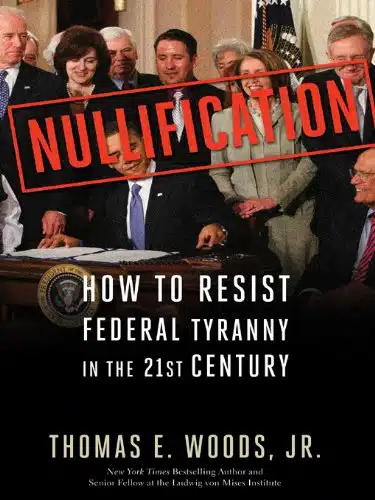Robert A. Levy, who describes himself as a “libertarian”, writes in a New York Times op-ed that the idea of state nullification of unconstitutional federal laws is invalid because the federal government says so.
Levy begins by pointing out that a number of states have passed legislation nullifying federal gun law, and then argues that “there are limits” on what states can do “to prevent enforcement of constitutionally valid regulation.”
This is, of course, the fallacy of begging the question.
“The bills are based on the theory of nullification,” he continues, “which has its roots in the late 18th and early 19th centuries and holds that the federal government exists by the will of the states, and that states therefore have the right to decide which federal laws are constitutionally valid within their borders.”
Levy acknowledges that “no state is required to enforce federal gun regulations”, but rejects that “states may prevent federal officials from enforcing laws declared by the state to be unconstitutional” on the grounds that “federal officials are authorized to enforce their own laws, even if they cannot compel the states to do so.”
But how are federal officials “authorized” to enforce a law if it is unconstitutional? To answer that, Levy again begs the question, asserting that whether or not a law is unconstitutional “is up to the federal courts”, not the states.
Levy commits this fallacy repeatedly. “In assessing constitutionality,” he writes, “our system of governance recognizes one Supreme Court, not 50 individual states.”
He then contradicts himself by raising the question of “whether the Constitution holds that federal gun laws are unconstitutional. If it does, then states would be justified in preventing enforcement.”
Ah, so states may prevent federal officials from enforcing unconstitutional laws!
But in his very next sentence, he asserts again that federal gun laws are not unconstitutional. How do we know? Because “the Supreme Court has not gone that far.” That is, his argument is that since the Supreme Court has not declared that federal gun laws violate the Constitution, they don’t. The Supreme Court is infallible, in his view, and whatever it says must be true.
So federal gun control laws infringing on the individual right to keep and bear arms are constitutional because the Supreme Court says so, even though the 2nd Amendment to the Constitution explicitly prohibits the federal government from enacting any legislation infringing on the individual right to keep and bear arms.
Levy apparently thinks by repeating his fallacy over and over again, it will somehow become a logically valid argument. Thus, he again repeats, “until the courts say otherwise, federal gun laws are presumptively consistent with Second Amendment rights.”
One wonders what part of the 2nd Amendment’s explicit prohibition on federal authority, which states that the right to keep and bear arms “shall not be infringed”, the federal courts and Mr. Levy do not understand.
Of course, it’s not only about gun laws, Levy points out, offering the further example of nearly two dozen states that have legalized medical marijuana “in defiance of federal restrictions.”
Mr. Levy apparently frowns on this, too, once again begging the question by concluding that while there are “risks in the expansion of federal power, particularly when it comes to intrusions on basic rights”, nevertheless, “to defend those rights, we can’t begin by flouting the very document that inspires that fight in the first place: the Constitution.”
What about the logic of the principle of nullification, that since the federal government was created by a compact between the states, those states reserve the right to determine whether laws made by their creation are authorized by that Constitution? Does Levy present any argument for why this logic is invalid? No. Why not? Presumably because he can’t, since it is sound reasoning. Hence his total reliance on a single logically invalid argument, which says that if the federal government determines that its own laws are constitutional, then they therefore must be constitutional.
This is, of course, patent nonsense.
To learn more about nullification, I highly recommend Tom Woods’s book, Nullification: How to Resist Federal Tyranny in the 21st Century.



